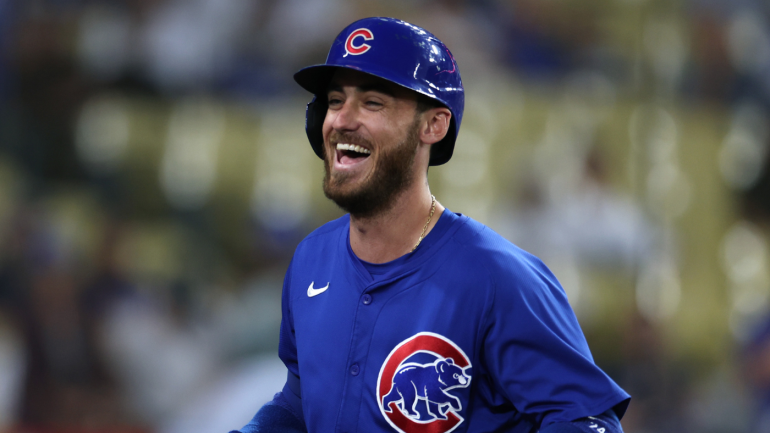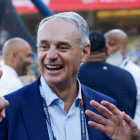
More than a week has passed since the New York Yankees lost out on the bidding for Juan Soto to the Mets, their closest geographical rivals. In the time since, one particular name has been linked to the Yankees as they seek a new middle-of-the-order slugger: Chicago Cubs outfielder Cody Bellinger.
Bellinger, 29, is a former National League Most Valuable Player Award recipient who hit .266/.325/.426 (111 OPS+) last season with 18 home runs and nine stolen bases. The Cubs, nonetheless, clearly desire to move Bellinger for the purpose of then reallocating his $27.5 million salary for next season to other parts of their roster. (It should come as little surprise that the reported hang-up in talks between the Yankees and Cubs stems from how much of Bellinger's salary the Yankees would have to assume.)
While Chicago's stance on Bellinger is easy enough to understand, you might wonder why the Yankees would want to obtain a player that another team views as fungible. Below, we've highlighted three potential explanations.
1. Upside play
Bellinger's career has played out in such an unpredictable manner that it's hard to get a feel for how he'll perform in any given year. Consider this: his OPS has either improved or declined by at least 110 points on a season-by-season basis in each of the last seven years. The aforementioned Soto, meanwhile, has had his OPS finish within a 70-point window in three of the last four years. One is easier to set your watch to than the other.
There is a team-building philosophy that says if you can't get reliable excellence (like Soto), then the next best thing is occasional excellence. In other words, it's possible the Yankees view Bellinger as a better upside play than some other options. After all, he's on the right side of 30 and is only a year removed from launching 26 home runs and posting a 139 OPS+. He also seems like an interesting fit for Yankee Stadium.
Again, the Yankees don't have to believe that Bellinger can reestablish himself at that MVP level to make him a worthwhile get; they just have to believe his chances of making an impact are higher than the alternatives. Is that a fair assertion? It just depends on which players are included in that pool; we would've said no compared to new Cubs outfielder Kyle Tucker, but yes if the comparison point is free-agent first baseman Christian Walker (a mid-30s righty hitter with a climbing K rate).
2. Promising ballpark fit
Were you designing a batter who might get more from playing in Yankee Stadium than any others, you'd likely settle upon a lefty with pull and fly-ball tendencies. We'll give you exactly one guess as to where Bellinger falls on those spectrums.
Too easy. Bellinger is particularly adept at pulling the ball in the air, ranking in the 89th percentile in that category, according to Robert Orr's calculations.
How might Bellinger's numbers be aided by playing his home games at Yankee Stadium? Per Statcast's calculations, his exact batted-ball outlay would've resulted in six more home runs (giving him 24 total) if he had played in friendlier confines. Only two other parks (those in Philadelphia and Cincinnati) were considered better fits.
The past doesn't always predict the future, so there should be implied error bars on all of the above. Still, if you're the Yankees, you probably feel good about Bellinger's chances of having success in the Bronx -- if only in the Bronx.
3. Value proposition
We'll close out by pointing out a contradiction in Bellinger's game: his contract contains a lot of risk … and a lot of potential reward.
Not only will Bellinger make $27.5 million next season, he has a player option for the ensuing season that could see him bank another $25 million. (He also has a $5 million buyout.) For him to exercise that option would mean that he had a disappointing season, the type that limits his ability to fetch a longer or more lucrative free-agent deal. The flip side is that if Bellinger has a good year, his employer will see him opt out and try free agency again ahead of his age-30 campaign.
Why would the Yankees be willing to take on that situation? Because the value proposition may be better than what they can find elsewhere on the market.
Everyone agreed that the Los Angeles Dodgers got a good deal last winter when they signed Teoscar Hernández to a one-year pact worth $23.5 million. Hernández then performed well, amassing more than four Wins Above Replacement before returning to the open market. That would be what the Yankees desired from Bellinger: come in, mash, and leave without requiring a real long-term commitment. The Yankees would, under that scenario, retain their long-term flexibility without necessarily lowering their short-term competitive aspirations.
Between that and the factors mentioned above, you can understand then why the Yankees seem to have a great deal of interest in adding Bellinger to their roster over the coming weeks.

















